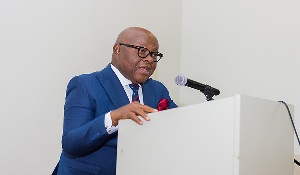 The Speaker of Parliament, Professor Aaron Michael Oquaye
The Speaker of Parliament, Professor Aaron Michael Oquaye
The Speaker of Parliament, Professor Aaron Michael Oquaye has specified the need for cooperation between Parliament and the Ghana-India Kofi Annan Centre of Excellence in ICT (AITI-KACE) to aid the former go paperless.
Professor Oquaye who bewailed the poor record keeping attitude in the country, believes AITI-KACE can be a fulcrum to assist in curing such a canker, expressing the wish that the activities of the Legislative House to be done electronically to fast track proceedings and also help the House to keep records.
According to the Speaker, it is unfortunate that even the independence proclamation delivered to Ghana by Queen Elizabeth II could not be found anywhere in the country unless in the archives in England.
The speaker of parliament said this at a handing over ceremony of $1m grant by the Government of India through its High Commission in Ghana, as part of the commemoration of the 250 years birthday of Mahatma Gandhi, as the special guest of honor.
The grant is to aid AITI-KACE to expand its skills in Information and Communication Technology (ICT), by adopting modern strategies.
Professor Oquaye expressed the belief that an enhanced and proper use of Information Technology is required, and with that Kofi Annan Centre of Excellence has the capacity to execute that.
“The last time I met my Board, I said to them that our Parliament must become a paperless Parliament. An institution full of ICT and as I sat there, I was thinking of the kind of cooperation with the Kofi Annan ICT Centre of Excellence, institution which would allow a new frame of mind in mastering and administering activities of parliament,” Prof. Oquaye hinted.
He indicated that as documentation continues to become more voluminous, the library of the future is ICT, and urged managers of AITI-KACE to make proper use of the $1m grant to promote ICT in Ghana.

Professor Oquaye continued that ICT is the future, and that anyone ignorant about technology may find it difficult coping with the system.
However, the speaker of parliament expressed concerns over what he described as the proliferation of ‘mushroom’ computer schools, which he said would need to be rationalized, therefore calling on the AITI-KACE to do it best to sanitize the system.
On his part, the Director General of AITI-KACE, Kwasi Adu-Gyan commended the Indian Government for its continuous support for the Centre, saying the $1m grant would assist in doing more for the advancement of technology in the country.
He said the centre would use the grant to explore areas of the government’s digitization agenda, and ensure that quality assurance or quality control in software is guaranteed.
According to Mr. Adu-Gyan, the grant will enable the centre proceed and achieve heights that would be recognized by international standards organizations, so far as software quality, evaluation and assessments are concerned.
“We will be able to help, not only the public sector, but the private sector to develop or to produce software that will be recognizable and accepted worldwide.”